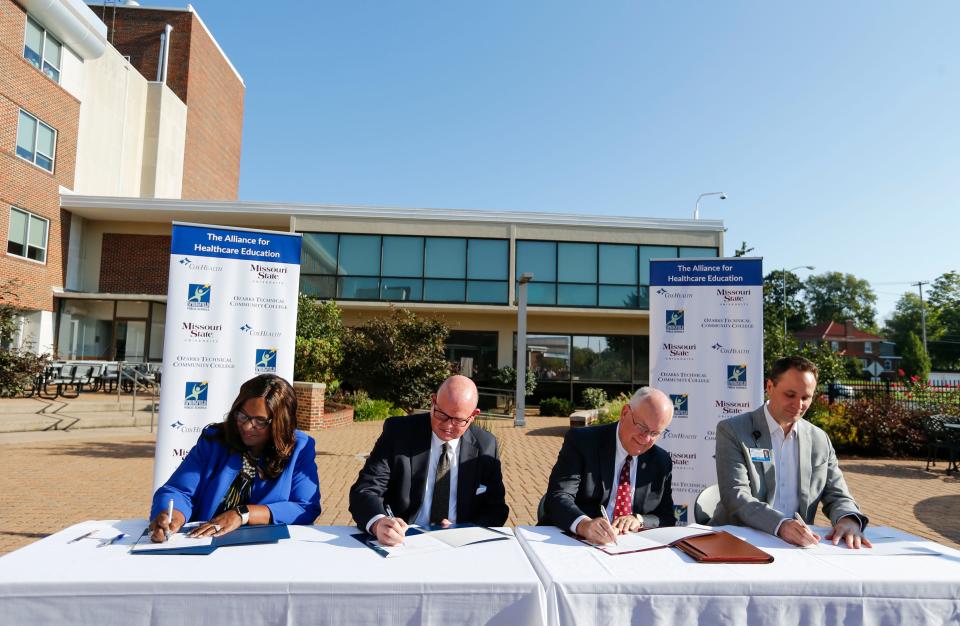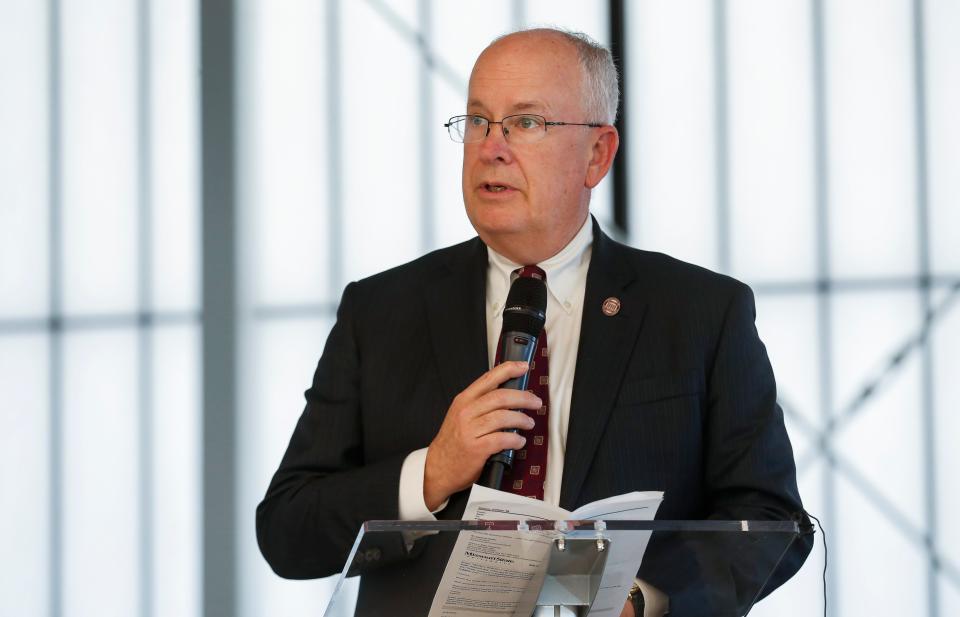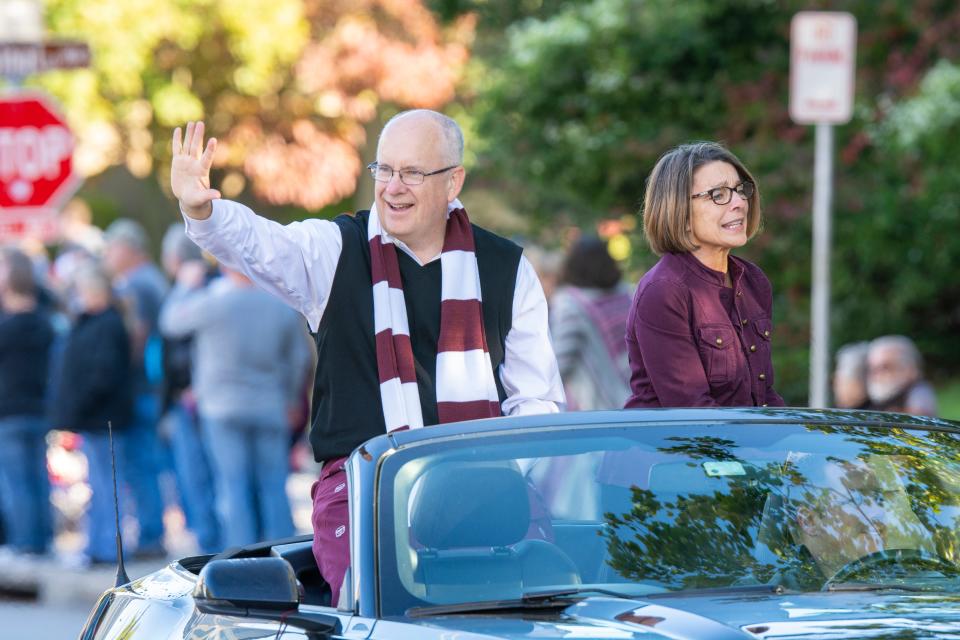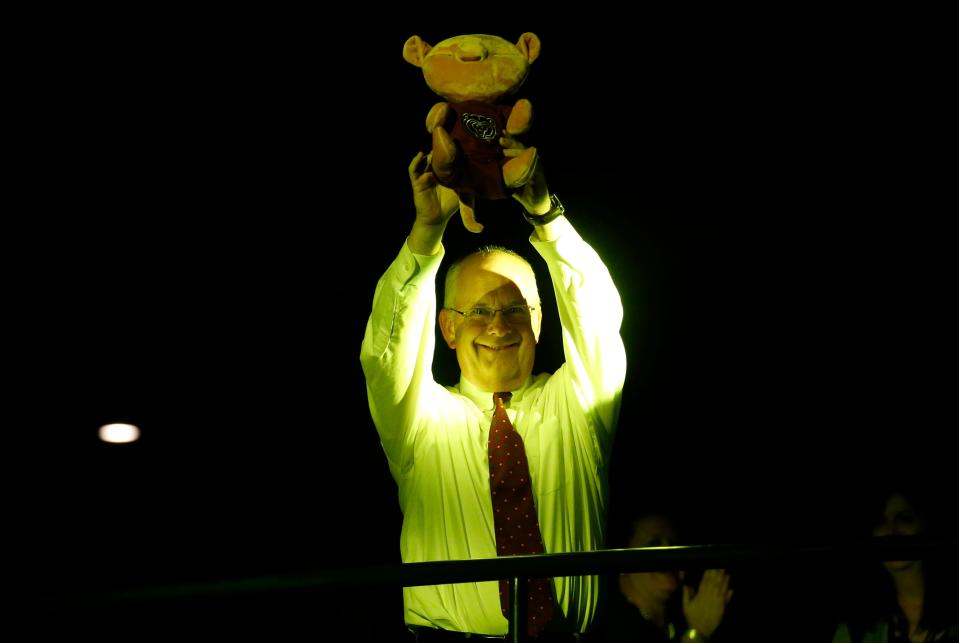End of an era: Missouri State University president Clif Smart to retire from 'job I love'
The Clif Smart era at Missouri State will soon come to an end.
The 11th president of the university announced Wednesday in a video — sent to faculty and staff before it was made public — that this academic year will be his last.
Smart, 62, will complete 13 years in the Carrington Hall office, making him the longest-serving MSU president since Roy Ellis stepped down in 1961.
"Being president of Missouri State University has been the biggest honor of my life. I love doing this job and I love this university," Smart said at the start of the video, which runs 3 1/2 minutes.

Smart highlighted multiple milestones during his tenure: setting enrollment, graduation and retention records; expanding academic offerings; raising more than $440 million over two fundraising campaigns; constructing and renovating dozens of buildings; improved diversity among students and employees; and reaching the football playoffs "after a 30-year drought."
"We did all this while raising tuition by less than inflation so that we remain the most affordable big university in this part of the country," Smart said on the video. "I'm really proud of what we've accomplished together — but, it's time to pass the baton."
Smart has repeatedly earned rave reviews in annual evaluations by the MSU Board of Governors, which has offered retention bonuses in recent years.
Board chair Chris Waters said the university has thrived under Smart's leadership.
“He saw us through the very challenging years of the pandemic and has moved the university forward in too many ways to name," Waters said in a statement.
"Clif’s visionary leadership, unwavering commitment to academic excellence and genuine passion for the growth of our students has left a lasting mark on our university. Clif has led with integrity and innovation."
Even though Smart will leave two years before his contract was set to expire in 2026, Smart said the timing was right for the next leader to step in and "build on the good work" completed so far.
"I committed when I took this job that I'd stay at least 10 years and we've accomplished a lot of the things that were on my plate," said Smart, noting the average tenure for a university president is six years. "Both professionally and personally, this is a good time for me."
He did not disclose any specific plans for the next chapter.
The day Smart was introduced as the interim president of Missouri State, he made a promise: "I pledge that … I will do nothing out of selfish ambition or vain conceit but in humility will consider others better than myself."
This week, Smart said he tried to live up to that. "My goal has been to make the university as good as it can be in my tenure and elevate the work of others in the university and I've tried really hard to do both those things."
"Two very different and wonderful careers"
Smart did not become president after rising through the traditional ranks of academia. This job was not even on his radar.
The son and grandson of educators, Smart's passion was the law. He became a trial attorney in the U.S. Army Judge Advocate General's Corps and then in private practice.
He achieved success and wealth and was short-listed twice for vacant positions on the Missouri Supreme Court.
"I have had two very different and wonderful careers. I loved practicing law particularly with Tom Strong and team over there," he said of his 21-year law career, most of which was in Springfield. "But that burns you out. I was ready to do something else."
In 2007, seeking more time for family and community service, Smart accepted a job as general counsel at Missouri State under then-president Mike Nietzel.
Nietzel was succeeded by the short-lived and tumultuous tenure of James Cofer. It triggered public scrutiny, staff turnover and uncertainty.
The campus had become increasingly disconnected from the community, the state auditor was critical of spending — from travel to presidential compensation — and deep budget cuts loomed.
More: Timeline: MSU president Clif Smart's career, highlights since 2011 and community service
Cofer resigned shortly after an embattled provost. A steady hand, Smart reluctantly agreed to step into the interim role during a search for a permanent replacement.
"I thought I'd do it for eight or 10 months and go back to the job I knew," Smart recalled. "As it turned out , it was an amazing opportunity for me and for (wife) Gail."
He said the youngest of their two sons had just left for college and the couple became immersed — and found they loved the work.
Smart's initial salary was $180,000, roughly $50,000 more than he made as general counsel and $95,000 less than Cofer was paid.
His base salary is now $427,409.

From the start, Smart declined many of the fringe benefits that had become the norm for presidents. He refused to accept a university car or car stipend and donated the $45,000 annual housing allowance back to the university.
He agreed not to ask the university to pick up the tab when his wife joined him on trips and vowed not to accept free meals unless they were part of Missouri State events.
Over the years, Smart has donated part of his salary to the university. He and his wife have also donated to student scholarships and programs, and they pledged $1 million to create four endowed professorships.
Given his lack of academic credentials, Smart immediately named Frank Einhellig, a longtime dean of the graduate college, as provost. Einhellig retired last year.
Smart said similar skills are needed to be a trial attorney and university president, including public speaking, but the roles are much different.
"At the university, you are working with everyone to accomplish things all together. Faculty, staff, students, alumni, community leaders, legislative leaders most of the time pulling together to help make things better and more productive and successful," he said. "It is a much more positive environment."
He said one of the perks of the job is reaching beyond the campus to make Springfield better. "I have loved that part of the job."
"Taught me a very good lesson"
Smart was officially hired as president in 2012, but the years since have not always been smooth sailing.
The global pandemic upended campus life and required tough decisions about masking, testing, in-person learning, quarantining and student events.
In recent years, Missouri State has worked to raise pay in a competitive job market, make spending cuts to balance budgets amid higher-than-average inflation, complete construction and renovation projects despite supply chain delays, and figure out ways to grow enrollment during a shifting higher education landscape.

Smart said there are situations he would have handled differently with the benefit of hindsight.
"I had a vice president-level person that was not a good fit and didn't in a timely manner get that resolved and the result of that was for both (the person) and I and our team and the university, we bogged down and weren't as functional as we could be," Smart said. "It taught me a really good lesson that while it's a great thing to mentor and coach and try to help people be successful but there comes a point, if that is not working, you have to be willing to make the hard decision and cut someone loose and move on."
Looking back, Smart said there are a lot of decisions he and others made that make him proud. He identified a few in particular, starting with Missouri State becoming a recognized doctoral-granting institution.
"That is a huge thing for the profile of the university and impacts so many things in terms of recruiting faculty and staff and students and serving our community," he said. "That is a significant accomplishment that I was personally involved in at different levels."
Smart said the look of the Springfield and West Plains campuses have benefited from renovations and construction projects during his time. "The university is just different and it is better and it has state-of-the-art facilities and that helps with teaching and learning."
He said with the help of lawmakers, the university has been able to achieve a more equitable level of state funding to "catch up" to where Missouri State needed to be following years of enrollment growth.
Smart said the university has become a bigger player in economic development for the region due to expansion of the Jordan Valley Innovation Center and efactory in IDEA Commons near downtown.
"Creating that spirit of openness"
In this role, Smart said he has come to believe the mission of Missouri State is to be the "affordable big university" in the state.
"Working class and middle class people can send their children here and they can get a good education with limited debt and go on and have great careers," he said. "That is what we do ... and I am very proud of that."

Smart said it is a mission that has been embraced by his wife, Gail, who is frequently at his side. They host groups at their home.
"I could not have been successful at the level that I think we have been without her," Smart said, noting she is also involved in a range of community efforts, especially helping families struggling to make ends meet.
"We do events together and we travel together and we represent the university together and I do it better because of her involvement than I could do it alone. It is going to be significant for her to give that role up."
More: Gov. Parson, retired Sen. Blunt react to Clif Smart's plans to retire from Missouri State
As president, Smart has prioritized being visible and approachable. He encourages people to call him Clif, to reach out by email and on social media.
Smart has nearly 23,000 followers on Twitter and several thousand on Instagram. He posts and interacts regularly — showing off what is happening at the university and what he's doing — and students often seek him out to pose for photos.
He said being so active on social media did not come naturally.

Two years into the role, Smart said he didn't feel like he was connecting to students outside of meeting with leaders or different groups.
"Most students had no idea who I was," he said. "At the same time, social media was getting going and some young alums suggested that I get on Twitter."
Smart studied how other university presidents used the tool and avoided pitfalls. He gave it a try, it worked and next he started posting short and funny videos.
"It has been successful in creating that spirit of openness and transparency and ease of interaction, which is right in line with my leadership style and serves the type of population and the type of community that we have well," he said.
What happens next?
The university will conduct a national search to replace Smart.
The search will be managed in-house and will be led by a search committee that will be named by the end of September.
Smart said the profile of the university has grown and the vacancy will attract "many well-qualified candidates."
He told the News-Leader he expects at least one internal candidate: John Jasinski, a former university president who has been provost since July 2022.
Smart said, in the video: "While that search process is happening, I will still be doing the job I love with the people I care about."
Claudette Riley covers education for the News-Leader. Email tips and story ideas to criley@news-leader.com.
This article originally appeared on Springfield News-Leader: Missouri State University president Clif Smart will retire in 2024


